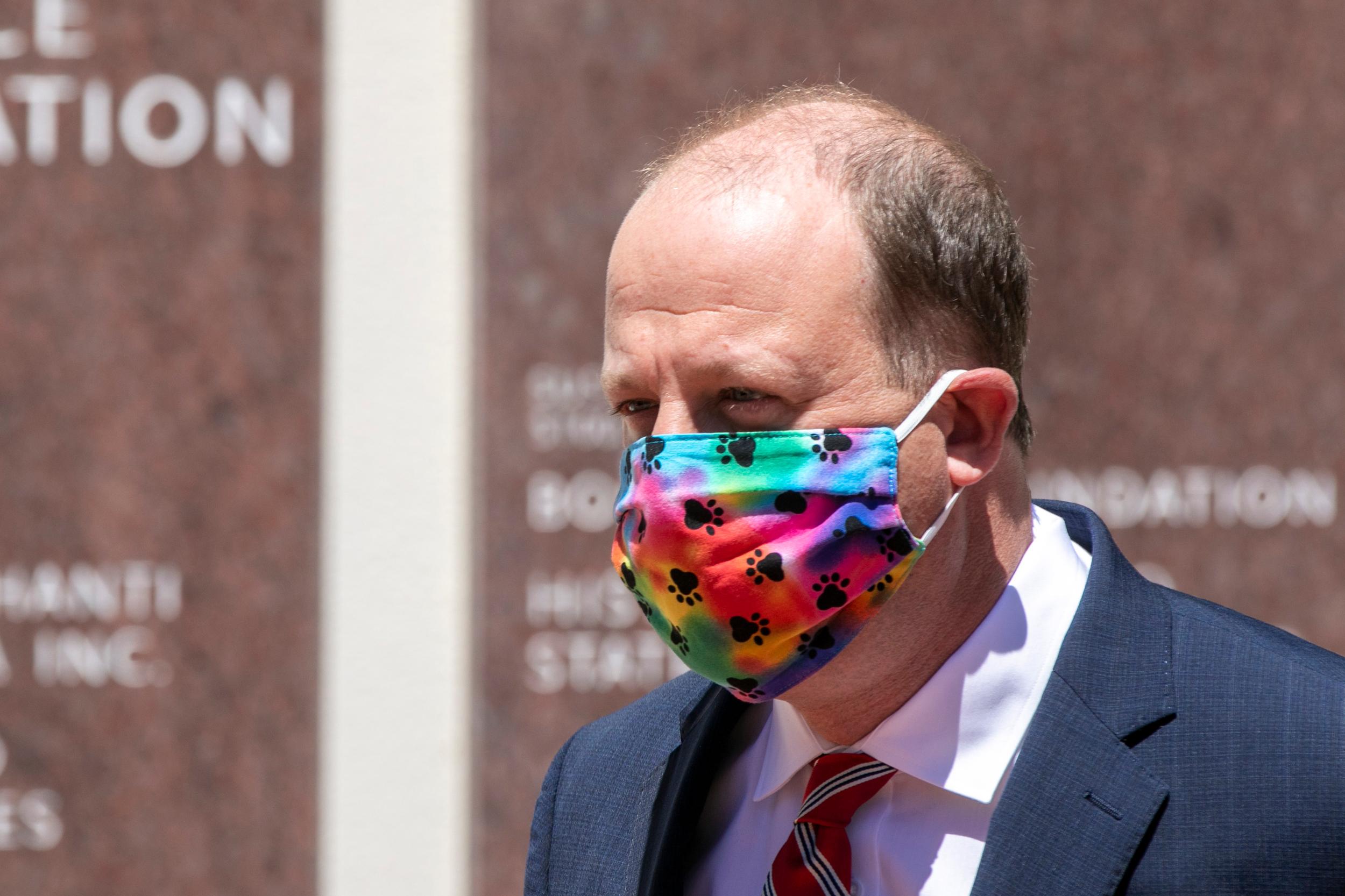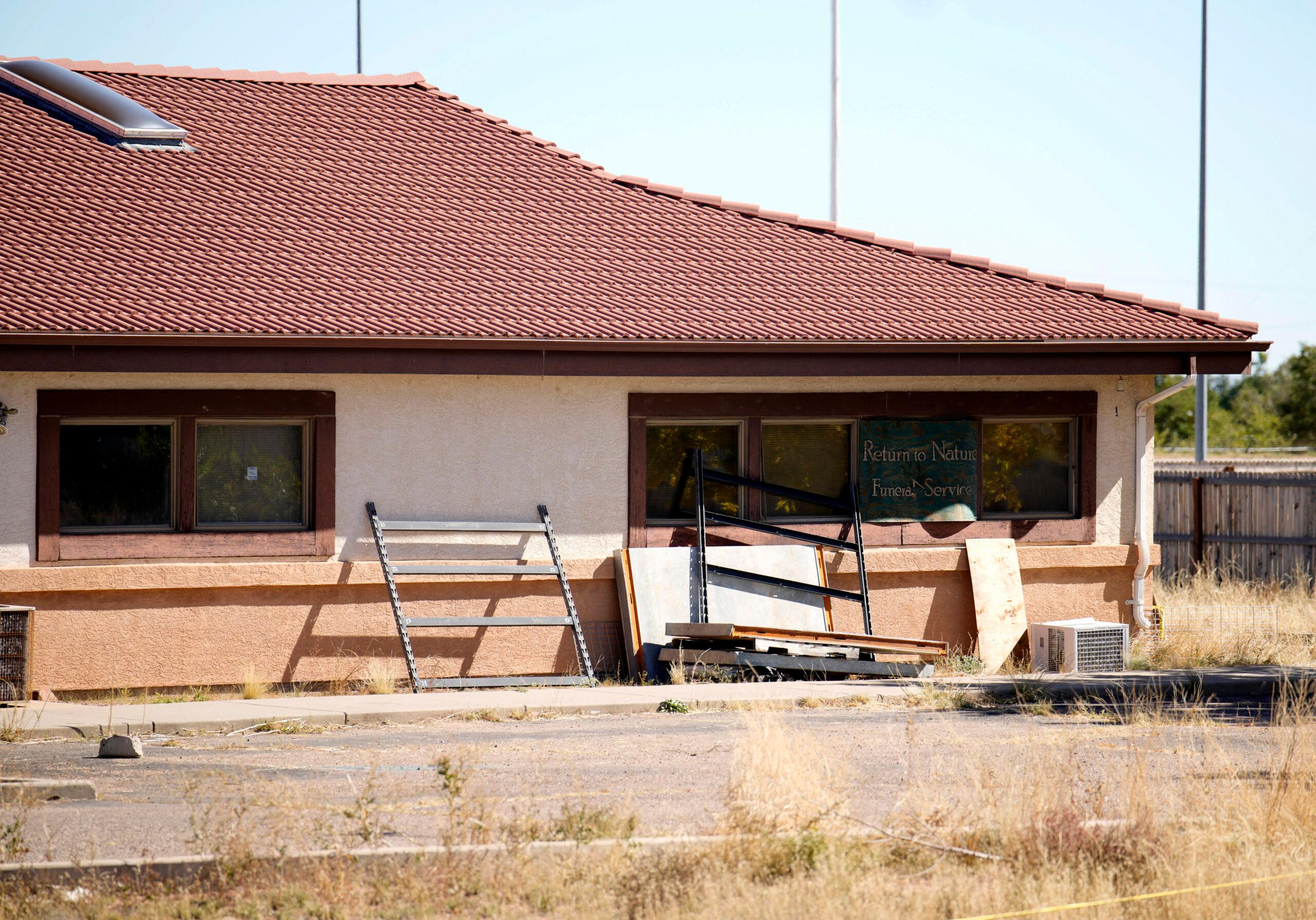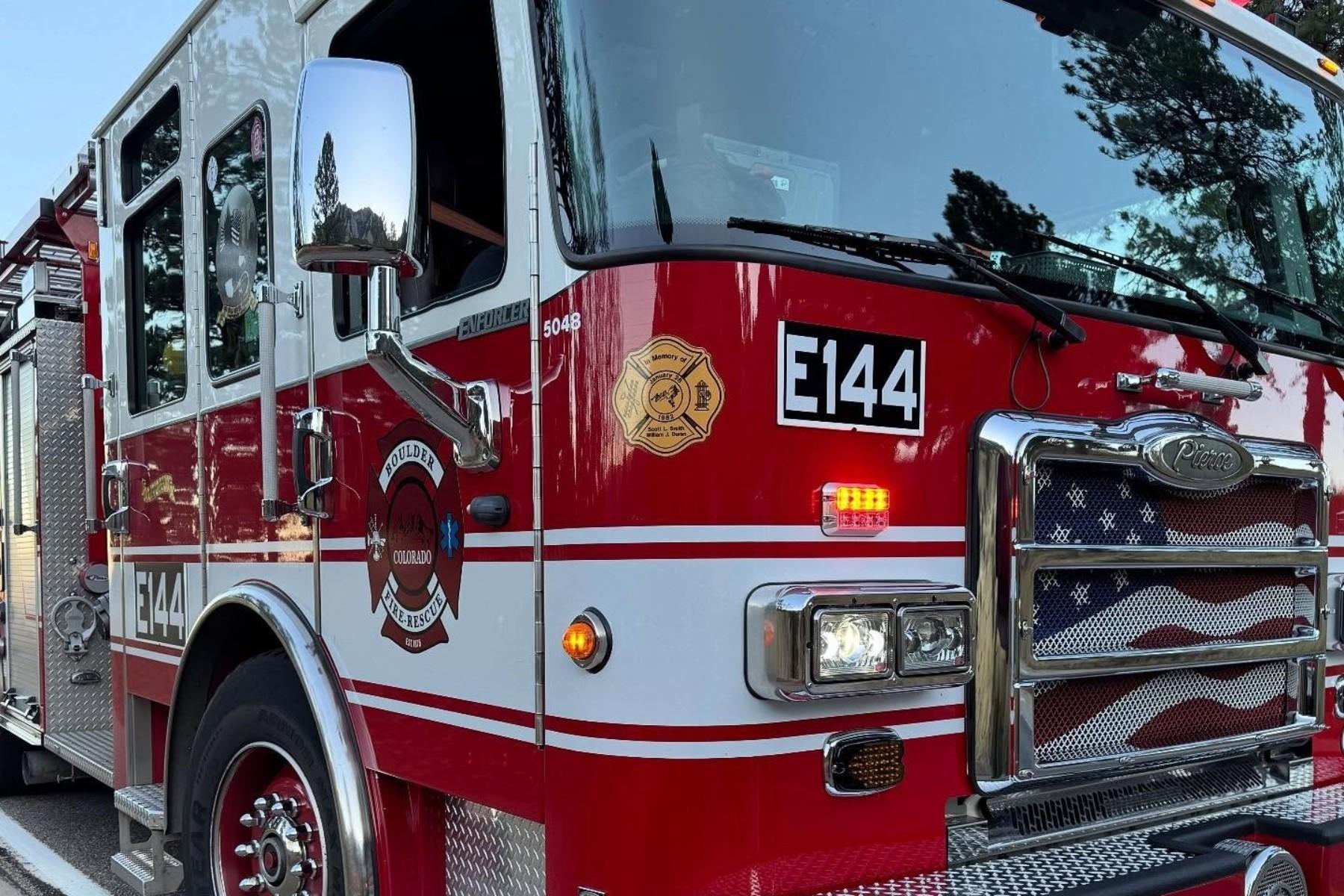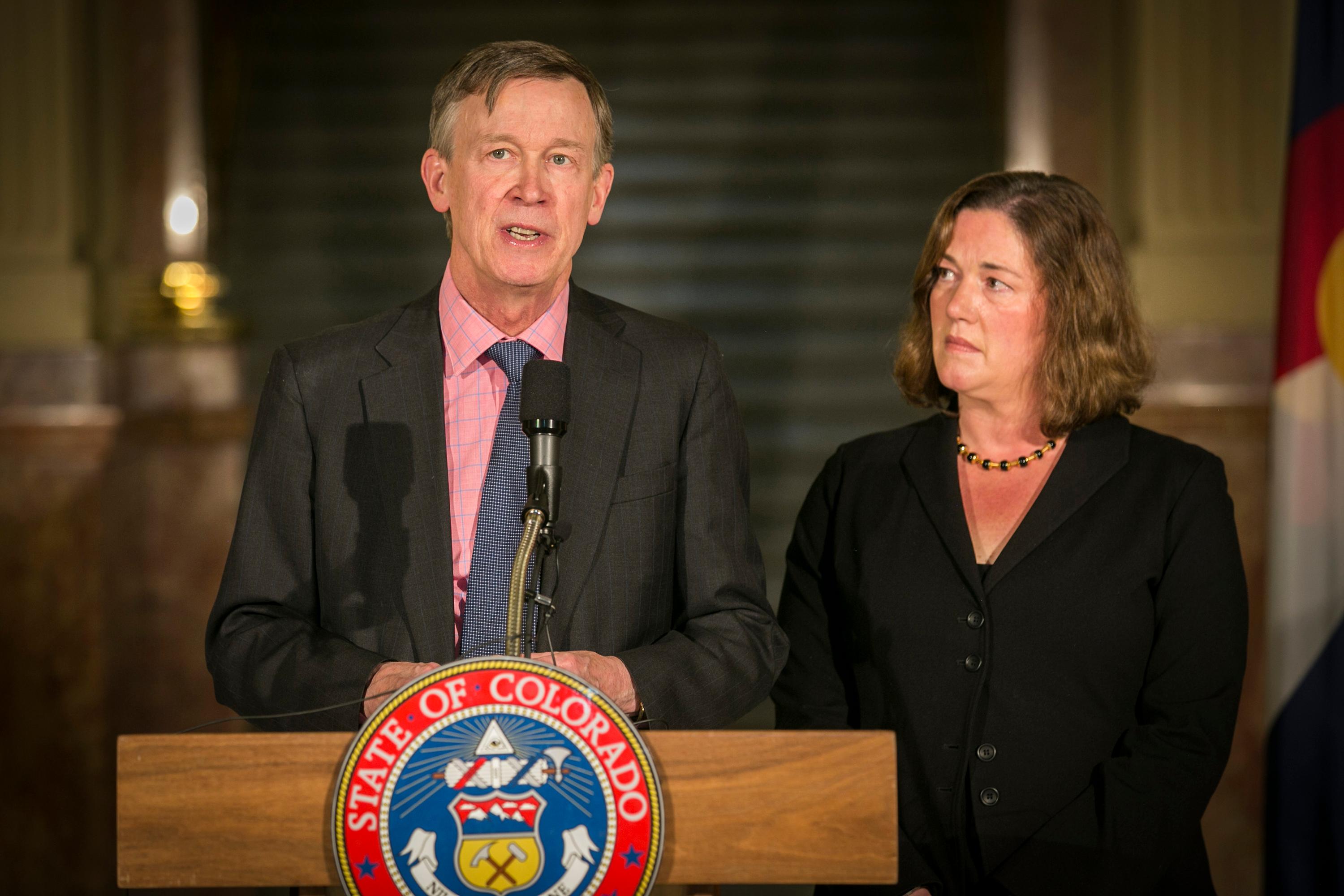
Colorado Gov. Jared Polis said he looked up the dictionary definition of the word “bastard” before he wrote it in a Facebook post over the weekend, and used it deliberately to make a point about fighting the coronavirus.
From the early days of the virus, scientists have urged people to wear masks to protect the people around them from respiratory droplets that carry the disease. In Sunday’s Facebook post Polis said there’s increasing evidence mask-wearers also reduce their own risk, and he wrote: “So, if you’re a selfish bastard and wearing a mask to protect others isn’t enough of a reason to do so, then maybe protecting yourself is?”
In an interview Monday with CPR News, Polis said “A month or so ago people said, ‘Oh, the masks protect others, the masks protect others,' which they do. The latest data, the latest science from the last few weeks shows very conclusively… that wearing a mask increases your own protection, reduces your risk of getting the virus if you’re exposed by two-thirds, which is a big deal.”
He said he’s frustrated that many people still refuse to wear masks. The dictionary definition of a bastard “is an unpleasant or despicable person, so that was the meaning that was meant in there and not the tertiary or archaic definition of a person who was born of parents who were not married,” he said.
“It's absolutely despicable to not take any precautions to prevent you from spreading the virus to others.”
It was the second time in a week Polis amped up his rhetoric about face coverings.
At a Thursday news conference, he used the phrase “wear your damn mask.” But he has repeatedly refused to issue a statewide order requiring them to be worn, even though the rate of positive cases and hospitalizations has grown slowly in the state.
“I’m certainly open to anything that increases mask wearing,” Polis said Monday. “But I don’t think there’s a lot of people waiting to say ‘I’m not going to wear a mask until Jared Polis says I have to.’”
While the case for masks has become a scientific consensus, there’s an emerging controversy over plans to reopen schools in Colorado. Many teachers argue it’s not safe, including Grace Koenigbauer, who teaches English at Conifer High School in Jefferson County.
“More than anything I want to be back there, at school… but at what cost?” she said. “I feel like I’m in a real rock and a hard place because my income is very important for my family’s survival. I feel like I don’t have a choice and I really do think teachers are in a position of once again making sacrifices for the greater good.”
Polis said teachers face the same risks and choices as other workers.
“This is really hard for everybody. It’s really hard for people who work in restaurants, in retail, trying to decide, is it worth risking my health or risking my job? It’s hard for, really, people across society. And of course, that means it's hard for educators. It's hard for teachers. It's a difficult decision to make.”
The key is to keep schools “as safe as reasonably possible, given the fact that we’re in a pandemic,” Polis said. And in the meantime, he said “I believe that we can’t interrupt education, we can’t sacrifice our future and our children’s future just because of the pandemic.”
Interview highlights
On reopening the investigation into Elijah McClain’s death:
“At the end of the day I was not confident that the prosecuting authority pursued every possible angle in charging criminally, the cops or paramedics and I think that we owe it to the family of Elijah, we owe it to the people of Colorado to make sure that we take every step possible in the context of the rule of law to hold the perpetrators accountable.”
On where he sees systemic racism in Colorado:
“I think you have to look everywhere, in all of our institutions. A lot of my background is in education… So I don’t want to diminish it in other areas — it’s in health, it’s in the economy, it’s everywhere, but it is absolutely in education in terms of access to a great school, the disproportionate amount of children who drop out from at-risk neighborhoods, from an economic perspective, so all of these educational inequities, that’s been a big part of my work.”
On the likelihood of widespread evictions unless the federal government steps in:
“I hope that aid for renters, aid for landlords and homeowners, I hope that that is all in a federal relief package.”
Read the transcript
Ryan Warner: Governor, thanks for being with us again.
Gov. Jared Polis: Always a pleasure Ryan.
RW: A growing number of school districts now plan to have students back in the classroom next month. We've received a lot of comments from parents and teachers who are worried about that. Here is Grace Koenigbauer who teaches at Conifer High School in Jefferson County.
Grace Koenigbauer: More than anything, I want to be back there at school. I want to be with my students. I want to engage with them and experience literature with them because that's the best way to do it, is in person. But at what cost? I feel like I'm in a really, a rock and a hard place because my income is very important for my family's survival. I don't know, I feel like I don't really have a choice and I really do think teachers are in a place of once again, making sacrifices for the greater good."
JP: Well, this is really hard for everybody. It's really hard for people who work in restaurants and retail trying to decide, is it worth risking my health or risking my job? It's hard for really people across society. And of course that means it's hard for educators. It's hard for teachers. It's a difficult decision to make. I mean, to walk away from a career that you put your life into or at least put it on pause, or do you... or are you willing to take on a little bit more health risk as we are across society, really in every different profession.
RW: So I don't hear you saying that there should be a special set of circumstances for teachers. In other words, they're facing the dilemma so many other types of workers are facing.
JP: Well. I think every Coloradan is facing this, Ryan. Certainly, I am. I'm out doing bill signings. I'm out meeting people. I'm wearing a mask and being careful, but I'm putting my family at risk. It's my job and I'm taking it seriously and I'm doing it. But there's other Coloradans, especially those with preexisting conditions that want to be able to stay home. And I completely respect that decision.
The state guidelines are going to make schools as safe as reasonably possible. And parents are faced with this dilemma too, Ryan, across our state. ‘Do I send my kids to school or do I start out online?’ There's no right, there's no wrong decision. It's a difficult decision to make. I hope that if my kids’ school starts, I expect that they'll be in school. They're 8 and 6, third grade and first grade, but there's no right answer -- it’s everybody needs to take everything into account.
The schools are going to be as safe as reasonably possible, but it's like the question you ask yourself is, ‘Are your kids in summer camp? I mean, are you going out to restaurants? Are you going to stores?’ I mean, these are all the ways that we live and decisions that our people are empowered to make. And none of them have right or wrong answers. My daughter is in a summer camp because she loves kids. She thrives on that and my son isn't and he's happy not doing it. The summer, they're taking the precautions they can, but you know parents across the state are making the right decisions for their families.
RW: You've said repeatedly that you think it will be safe for schools to open with say 25 kids in a classroom. The state's current Safer at Home rules limit gatherings to 10 people. So with COVID-19 cases and hospitalizations trending upwards, though modestly compared to some other states, how safe are the kids and teachers in a class of 25? I mean, those things don't seem to jibe.
JP: Well, the current guidelines are gatherings up to 50 people. I mean, if you're in a public building. We already have day camps that are in groups of 25. So that's similar to what education would be like. So far it's been a reasonable experience with camps. As expected, there's been a few outbreaks, but by and large, most kids in Colorado had as much of a normal summer as possible. I mean, the key thing for schools is to be as safe as reasonably possible given the fact that we're in a pandemic. What that generally means is keeping cohorts isolated so that we don't have passing time and recess where hundreds of kids mix together, that simply can’t occur in a pandemic, and just as bars and nightclubs can't occur during a pandemic. Nobody's figured this out. We haven't figured out how to have a freewheeling recess or passing time with hundreds of kids. We haven't figured out how to have hundreds of drunk 22-year-olds together in a nightclub. No one has figured that out. And in the meantime, while we're foregoing some things, I believe that we can't interrupt education. We can't sacrifice our future and our children's future just because of the pandemic.
RW: 178 different school districts are making plans for reopening classrooms next month. The state constitution has always given the districts the right to set all of their own policies, but is that sort of local control with differing rules and different messages an effective way to fight a pandemic?
JP: Well, the pandemic is in a very different situation in different parts of our state. There's rural school districts in our state that have had zero cases of coronavirus for a month or two. So that's very different than a district that might have hundreds of cases in their area.
What's important for every district, is that they prepare to go online if needed. And there's two reasons they might need to do that. One is, many parents won't be ready to send their kids back to school, so those school districts need to be ready to offer that online virtual experience at least for the first few months for those kids. The second reason is if there's an outbreak at a school, they likely will be closed by the local health department for a period of a week or two, while there's an incubation period and testing before they can safely reopen. So every school district needs to be prepared to go online if needed to protect the health of their staff and the teachers and of the kids.
RW: Help me understand why you don't think that should just be the default, that next fall resumes online.
JP: Well, just as there are, of course, going to be some parents who are not ready to send their kids to school, there's many, many parents, probably the majority, that really don't want their kids to fall behind and want them to be in that in-person environment. There's many teachers that are itching to get back to the classroom and we are all ready to move forward as a society in as safe a way as possible. It's about the new normal. Most of you who go to work, you go to work Ryan, but you're going to work in a different way. I don't know whether you're at the studio or not, but if you are, I'm sure it doesn't look... Oh you are, but it doesn't look exactly like the studio looked three or four months ago, right? I mean, it's a different feel. There's probably less people, you're spread out.
Schools are going to be a different feel, your workplace, my workplace, all different. But we have to figure out how to live in a sustainable way until there's a vaccine or cure. And of course, school and education are part of sustainability. I mean, they're a bedrock of society.
RW: Just to go back to one thing you said at the beginning, is this an existential moment for teachers? It sounds like how you see it, is that they are making the decision of whether to go into the classroom at least part of the week or whether to leave the profession. Is that how you see the tension here?
JP: Well, I think that there's many opportunities for educators to continue with virtual and online because I don't know whether it's going to be 10% of our students or 30% of our students, but whatever percentage it is, many students are going to start the year online. For every student that does, there need to be educators that are willing to work in that online environment, presumably working from their own home. So just as there's teachers that are eager to get back to the classroom and interact with kids, there's others teachers that are very worried about their own health. Maybe they're older, maybe they have a preexisting condition and they want to start out online. And I know that many districts are prioritizing those online education opportunities for teachers who are themselves at risk.
RW: Last week, Governor Polis, you told Coloradans to quoting here, "Wear a damn mask." And then on Sunday you posted on Facebook that there's increasing evidence a mask protects the person wearing it, not just others in the vicinity. You wrote, "So if you're a selfish bastard and wearing a mask to protect others isn't enough reason to do so then maybe protecting yourself is?"
Walk us through when you wrote that post and using the word bastard. I have to think that there was a moment where you said, ‘Is that the right word?’ ’’
JP: Well, I looked it up in the dictionary before I used it. It does not usually mean illegitimate child. To be clear, that's an archaic meaning, it's the third meaning. It's meaning was appropriate for that. I'll look it up while we're on the phone here. But yeah, I think I have, hat I and a lot of Coloradans have is less and less patience for people that are not wearing masks. I mean, they're putting others at risk and then obviously they don't care about others because they're not wearing masks. And the point I was trying to make is, ‘You know what, it's not just about others’ because you remember initially a month or two ago people said, ‘Oh, the masks protect others, the masks protect others,’ which they do. But the latest data, the latest science from the last few weeks shows very conclusively -- and this was the link in the article -- that wearing a mask increases your own protection, reduces your risk of getting the virus if you're exposed, by two- thirds, by two-thirds. So it's a big deal.
The definition of bastard is an unpleasant or despicable person. So that was the, obviously meaning that was meant in there and not the tertiary and archaic definition of a person who was born of parents who were not married.
RW: Yes, right. I actually didn't mean to imply that you were using that term in a different way. I guess the point is the first definition. That's a pretty inflammatory thing to call citizens of this state, just say a few more words ...
JP: It's absolutely despicable to not take any precautions to prevent you from spreading the virus to others. When we know that about half of transmission occurs from people who are asymptomatic before they manifest symptoms or have an asymptomatic infection. That is a completely inappropriate way to act. And the vast majority of Coloradans understand that there's so much frustration with folks...
RW: So here's the question. Why not channel this passion into a mask mandate statewide? And I just want to say when we solicited questions for you, this was one of the most asked questions. Why not just say, ‘They're required. Period.’
JP: Yeah. I mean, I'm certainly open to anything that increases mask wearing. Right now more than half of our state is under a mask mandate. I think it's over 50%, close to 60% of the people of our state. And of course I'm very interested in how that mandate affects whether masks are used or not. So we all... I'm me, I'm very evidence-based or science-based. If it actually helps, we're happy to do that. But I don't think there's a lot of people that are waiting to say, ‘I'm not going to wear a mask until Jared Polis says I have to.’ Because frankly, in the places with mask mandates like Denver and other areas, you still see people without masks, right? I mean it... So I'm very interested in the data. My goal and my desired outcome is to maximize mask wearing, reduce the spread of the virus and allow for an economic restoring, economic recovery.
RW: That is to say, you have not seen data that backs up that a mandate would change the numbers dramatically.
JP: No, we've seen areas of Colorado with good compliance that have mandates, areas with good mask wearing that do not have mandates. We also have areas that have a mask wearing requirements that don't have good compliance. So the goal is mask wearing. The latest push that I've talked about is that it also prevents you from getting the virus. That's why I was using that strong language around damn and bastards and things that I don't normally say because what I'm trying to show is this actually protects you. It's not just this selfless act and altruistic, which I hope moves most Coloradans. And yes it does. But even if you're somebody who doesn't care about other people, I hope you care about yourself.
RW: To a different topic now, policing, especially in minority communities. There's been renewed focus on the case of a young man in Aurora, Elijah McClain. In August of last year, officers responded to a report of a suspicious man and stopped McClain. He had broken no laws. They said he resisted their commands. They put him in a chokehold and injected him with ketamine. He went into cardiac arrest and ultimately died. The three officers involved were not charged. The district attorney has said that's because the cause of death is undetermined. You recently appointed the attorney general as the special prosecutor in the case. What do you think might be found that wasn't already?
JP: At the end of the day, Ryan, I was not confident that the prosecuting authority pursued every possible angle in the investigation, in charging criminally, the cops or paramedics. And I think that we owe it to the family of Elijah. We owe it to the people of Colorado to make sure that we take every step possible, in the context of the rule of law, to hold the perpetrators accountable. I have full confidence that the Attorney General's investigation will do so.
RW: What makes you say that? In other words, I gather you looked at the case and you saw the holes or what you perceived to be the holes. What were they?
JP: I was afraid it was dismissed too early without investigating potential criminal charges. There was a November letter from the D.A. And I agree with many of the voices of those who lent their solidarity through protest to say, ‘You know what, before we let those officers off scott free with no legal ramifications from a criminal perspective, we should have a thorough, independent investigation to see if they can be charged and convicted in a jury for violating any of the laws of the state of Colorado and the unfortunate tragedy and the death of Elijah McClain.
RW: Do I hear you saying then that it's the protests in large part that brought your attention to the case, because we are almost a year out now?
JP: Well I share the skepticism that the protestors have, sometimes protesters are right, Ryan. Sometimes they're wrong, sometimes they’re right, we all form our own independent decisions. In this case, I agree with the protestors that we should go through every length we can legally to see if laws were violated in the tragic death of Elijah McClain. And even if there weren't laws violated, we owe it to the people of Colorado to make sure that there is confidence in the process. Even if the process leads to a decision that there's no prosecutable offense. There's a lot of skepticism, including my own, including that of the demonstrators, including those of most of the people in Colorado that all possible avenues were thoroughly investigated.
RW: What does your own searching look like about race right now? About your own privilege and power?
JP: Well, it's tough. I think every American is also looking at themselves in a mirror. I'm of Jewish heritage and we are still in the generation of people -- I just signed a bill last week, Ryan, with a Holocaust survivor, Fanny Starr, to have Holocaust and Genocide Prevention Education in our school. So we're still, a generation is still with us that was industrially slaughtered, over 6 million Jews, just because of their faith and their heritage. And so we grew up with that and I think every Jewish American grows up with that. Americans of different heritage grow up with those legacies in their family of what's happened.
And it means that we need to understand that as America, we're a nation that welcomes everybody. We're a nation where everybody's equal under the law, but we know that those words in a document are only as good as they are in the field, in real life. And I don't think any of us think that --we fully recognize that ever-expanding promise of equality under the law and equality of opportunity, that right for life, liberty and pursuit of happiness that the founding fathers so wisely created and has been gradually expanded over time. So at least now it covers everybody in word, but it's up to us to make sure that it also covers everybody in deed.
RW: So I think I hear you saying that the darkness of what the Jewish people have faced, does that give you some perspective, some, a starting point to understand what others have experienced? Is that what I hear you saying?
JP: Well, that's just my own experience, my own family experience. Obviously I've never experienced being Black. I've never experienced being Latino. I've experienced being gay and I've experienced being Jewish. So we all start with our own experiences. My mom was not able to join the sorority that she wanted in college. She rushed it and they made some anti-Semitic remarks and then it was... they made clear that they didn't allow Jews in that sorority. A formative experience for my mother, right, in the 1960s. My father joined an all-Jewish fraternity because they didn't allow Jews in the non-Jewish fraternities at MIT that he was at that time. So this is something we grew up with in my parents' generation and my generation, of course, being gay as well as being Jewish. So everybody approaches this from, ‘What have I been through?’ But of course I haven't been Black. I haven't been Latino. I haven't been Asian American. And those are all things that we can learn from our friends that have walked a mile in those shoes.
RW: Where do you see systemic racism in Colorado?
JP: Well, I think you have to look everywhere, Ryan, really in all of our institutions. A lot of my background is in education. I served on the State Board of Education, I chaired it. I started charter schools to serve at-risk kids. So I don't want to diminish it being in other areas. It's in health, it's in economy, it's everywhere, but it absolutely is in education in terms of access to a great school, the disproportionate amount of children who drop out from at-risk neighborhoods, from an economic perspective. Our minority graduation rate is lower, matriculation through higher education. So all of these educational inequities, that's been a big part of my work of the last several decades, of course, as well as health inequities, economic inequities and others.
RW: I want to talk about the economy in the face of COVID-19. Colorado's unemployment rate is around 10% now. And since the pandemic started, Congress has supplemented regular unemployment benefits with a $600 additional weekly payment. Unless Congress acts, that'll expire at the end of the month. Separately, this weekend you extended an order requiring landlords to give 30 days notice of eviction. Neither extra unemployment nor relief from rent can last forever. What can the state do to cushion the financial burden on people if those benefits and protections either decrease or go away?
JP: First of all, we're appreciative of any federal aid that our citizens of Colorado get. And so we appreciate the Paycheck Protection Program. We appreciate the one-time cash payment to people. We appreciate the unemployment insurance and I'm very hopeful that Democrats and Republicans will be able to come together at the national level and pass another round of assistance for the people of America and that of course includes the people of Colorado. Beyond that we look at what we as Colorado can do, when working with the legislature, we were able to create a $20 million grant fund for our very small businesses who weren't able to get the Paycheck Protection Program, one-, two- three-person businesses. And then as you indicated, we also said instead of the normal (warning) by the way, you have 10 days to be evicted if you don't make payment, we're saying people should have the 30 days to catch up and that opportunity to kind of catch up on the rent payments to be able to stay in their home.
RW: Do you acknowledge there simply will be evictions as a result of COVID-19? Is that a fact that you accept as governor?
JP: Well, in the absence of federal action, that's likely to be the case. I hope that aid for renters, aid for landlords and homeowners. I hope that that is all in a federal relief package. In Colorado, we have a very tight fiscal environment. We worked with the Republicans and Democrats in the legislature to make some very difficult cuts this year. Colorado has a balanced budget requirement and we're not allowed to nor necessarily should we deficit spend. The federal government is able to borrow money at a very low rate, 1% or 2%. And I hope that they, as part of their package include something that helps renters across our state and across our country.
RW: Before we go, the legislature put a measure on the November ballot to increase the tobacco tax. And for the first time tax e-cigarettes and vaping products. Some of that money would go to the state’s operating fund, some to preschool programs that you strongly support. The last study that was done found Colorado ranked number one in the country for teen vaping. Do you think raising the tax on vaping products will reduce teen use?
JP: So, absolutely. We know that, I mean, this is science. We know what happens when you raise the tax rate on vaping and smoking products. This is a loophole that we want to close in Colorado. Vaping has a zero tax. It doesn't have the same nicotine tax that tobacco and chewing tobacco and pipe tobacco, all those things have because the way in our state that things get taxed is the voters have to vote on it. That's what we're going to be doing now. We want to close that loophole. We know that if we simply taxed vaping at the same rate as other nicotine products -- and I think the initiative also adjusts the nicotine tax to be more in line with where many other states are -- it absolutely will reduce the smoking rate probably by as much as 20% in our state. And the biggest impact are teenagers because they are the most price-sensitive and the most likely never to start vaping or smoking if we don't have it subsidized by not being taxed.
RW: Are you also pleased that it raises revenue?
JP: Well, it's important that the revenue is not a free check for politicians of the legislature. It goes to smoking prevention. It goes to preschool. I hope that it's a diminishing revenue source over time, Ryan, as less and less people smoke, but of course, it needs to be invested in a wise way in our future. And I'm confident that this initiative has the guardrails to do that as a powerful tool to reduce the teen vaping rate. Colorado wants to be number one in a lot of things, Ryan. We don't want to be number one in underage vaping and this initiative will fix that.
RW: Thanks so much for being with us.
JP: Thank you, Ryan.









